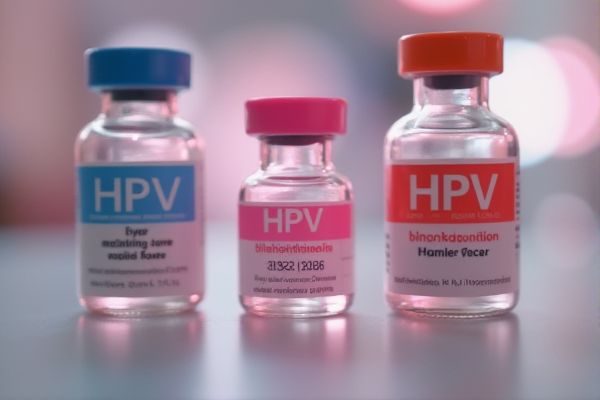
The HPV vaccine brand available in India is Gardasil, produced by Merck. This vaccine targets various types of human papillomavirus, which are linked to cervical cancer. It is recommended for both girls and boys aged 9 to 26 years to provide protection against these harmful strains. Your health provider can offer guidance on the vaccination schedule and benefits.
Brands to consider
Gardasil
Gardasil is a widely recognized HPV vaccine brand in India, providing protection against several types of human papillomavirus that cause cervical cancer and other HPV-related diseases. It is approved by the World Health Organization and has shown efficacy in reducing the incidence of cervical cancer through immunization. The vaccine is administered in a series of shots, facilitating easy integration into public health programs across the country. With rising awareness around HPV and cervical cancer prevention, Gardasil represents a proactive solution for healthcare in India, contributing to improved women's health outcomes. Engaging with healthcare providers about Gardasil can enhance your understanding and access to this vital vaccination option.
Cervarix
Cervarix is an HPV vaccine brand available in India, specifically targeting prevention against cervical cancer caused by high-risk HPV types. This vaccine is designed for females aged 9 to 25 years, providing immunity against HPV types 16 and 18, which account for a significant percentage of cervical cancer cases. Cervarix is administered in a three-dose schedule, ensuring long-lasting protection when followed correctly. The safety profile of Cervarix includes mild side effects, making it a viable option for individuals looking to protect their health against HPV-related diseases. Your healthcare provider can offer more information regarding its efficacy and recommendations for use.
Gardasil 9
Gardasil 9 is an HPV vaccine that provides protection against nine types of human papillomavirus, including those most commonly associated with cervical cancer and genital warts. In India, the vaccine is recommended for preteens and young adults, emphasizing early vaccination for optimal effectiveness. Clinical trials demonstrate its safety and efficacy, with the potential to significantly reduce the incidence of HPV-related diseases. Given the rising rates of cervical cancer in the country, Gardasil 9 offers a preventive measure that aligns with public health initiatives aimed at improving women's health outcomes.
Silgard
Silgard, known for its efficacy, is a prominent HPV vaccine brand in India. It protects against several strains of the human papillomavirus, including those linked to cervical cancer. The vaccine is recommended for both females and males, promoting overall public health. Clinical studies have demonstrated its safety and effectiveness, contributing to a reduction in HPV-related diseases. You can find Silgard available in various healthcare facilities across India, making it accessible for vaccination.
Papilguard
Papilguard is a prominent HPV vaccine brand in India, recognized for its effective prevention against various strains of the human papillomavirus, which can lead to cervical cancer and other HPV-related diseases. This vaccine is suitable for both girls and boys, providing widespread immunity in the population. Papilguard undergoes rigorous testing to ensure safety and efficacy, making it a reliable choice for vaccinations. Availability through multiple healthcare providers across India ensures accessibility for individuals seeking protection against HPV.
Immunization Schedule
The immunization schedule for the HPV vaccine in India typically involves two or three doses, depending on the vaccine brand. For example, the quadrivalent HPV vaccine, marketed as Gardasil, is administered in a 0-2-6 month schedule, while the bivalent vaccine, Cervarix, may follow a 0-1-6 month schedule. It is recommended for girls and boys aged 9 to 14 years, but catch-up vaccination can be offered up to age 26. Make sure to consult local healthcare providers for any specific guidelines regarding vaccination locations and availability.
Target Demographic
The target demographic for the HPV vaccine in India includes pre-adolescent girls, typically aged 9 to 14, as well as young women up to 26 years old. Parents and guardians play a significant role in decision-making for younger girls, highlighting the importance of community awareness campaigns. Healthcare providers, including gynecologists and pediatricians, are key influencers in promoting vaccination. Organizations such as the World Health Organization (WHO) provide guidelines to aid in increasing vaccine uptake and reducing cervical cancer incidents associated with HPV.
Approved Age Range
The HPV vaccine, such as Gardasil, is approved for administration in India primarily for individuals aged 9 to 26 years. This age range enables effective prevention of HPV-related diseases, including cervical cancer. Vaccination at an early age is recommended to maximize its benefits before potential exposure to the virus. You should consult a healthcare professional for personalized advice regarding the HPV vaccination schedule.
Dosage and Administration
The dosage for the HPV vaccine in India varies depending on the specific brand used. For the Cervarix vaccine, it is administered in a three-dose series: the first dose is given at a chosen date, the second dose is administered one month after the first, and the third dose is provided six months after the first dose. For Gardasil, the schedule is similar, with three doses given at 0, 2, and 6 months. It is recommended to consult healthcare providers for tailored advice on timing and administration based on individual health needs. Your healthcare professional will provide guidance on any necessary precautions or follow-up.
Efficacy and Safety
The efficacy and safety of the HPV vaccine, particularly the Cervarix brand, have been evaluated extensively in India. Clinical studies demonstrate that Cervarix effectively prevents the majority of cervical cancer cases caused by high-risk HPV strains. Safety profiles indicate that side effects are generally mild, including pain at the injection site and mild fever. Continuous monitoring is recommended to ensure long-term safety and effectiveness in the Indian population. Your awareness of these factors can aid in making informed health decisions regarding HPV vaccination.
 indiabrand.org
indiabrand.org